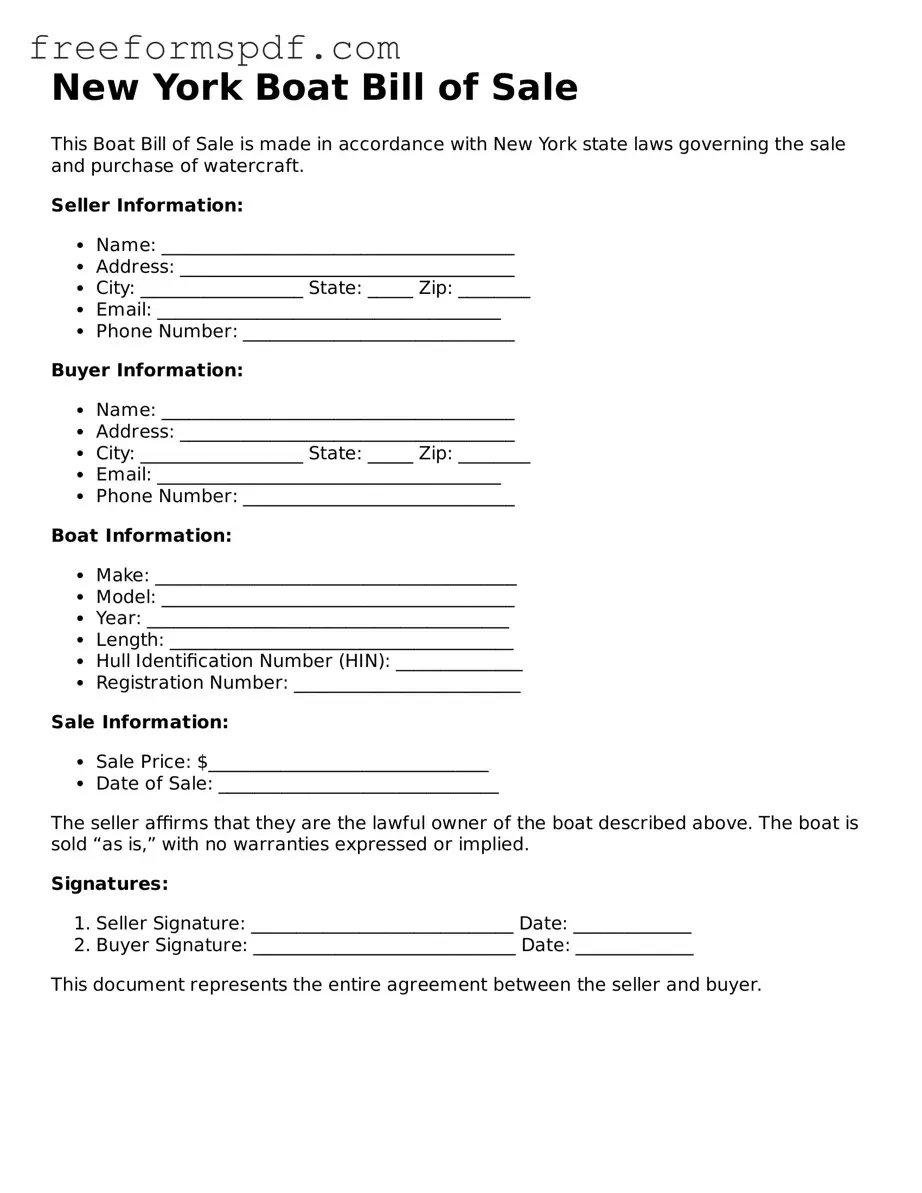Attorney-Verified Boat Bill of Sale Document for New York State
Common mistakes
-
Incomplete Information: Failing to provide all required details can lead to issues. Ensure every section is filled out completely.
-
Incorrect Dates: Entering the wrong date of sale can cause confusion. Double-check the date before submission.
-
Missing Signatures: Both the seller and buyer must sign the document. An unsigned bill of sale is not valid.
-
Wrong Identification Numbers: Using incorrect hull identification numbers or registration numbers can invalidate the sale. Verify these numbers carefully.
-
Improper Notarization: If notarization is required, ensure it is done correctly. An improperly notarized document may not be accepted.
-
Failure to Include Payment Details: Not specifying the payment method or amount can lead to disputes. Clearly outline how payment was made.
-
Neglecting to Keep Copies: Not keeping a copy of the signed bill of sale can be problematic. Always retain a copy for your records.
-
Ignoring State Regulations: Each state may have specific requirements. Familiarize yourself with New York's regulations regarding boat sales.
Learn More on This Form
-
What is a New York Boat Bill of Sale?
A New York Boat Bill of Sale is a legal document that records the transfer of ownership of a boat from one party to another. It serves as proof of the transaction and includes essential details such as the buyer's and seller's information, the boat's description, and the sale price.
-
Why is a Boat Bill of Sale important?
This document is crucial for several reasons. First, it protects both the buyer and the seller by providing a clear record of the transaction. Second, it may be required for registration purposes with the New York State Department of Motor Vehicles (DMV) or for obtaining insurance. Lastly, it can help resolve disputes that may arise regarding ownership or the terms of the sale.
-
What information is typically included in the form?
A standard New York Boat Bill of Sale typically includes:
- The names and addresses of both the buyer and the seller.
- The boat's identification number (HIN), make, model, and year.
- The sale price and payment method.
- The date of the transaction.
- Signatures of both parties.
-
Do I need a notary for the Boat Bill of Sale?
While a notary is not required for the Boat Bill of Sale in New York, having the document notarized can add an extra layer of authenticity. It can also be beneficial if there are any disputes in the future regarding the transaction.
-
Is the Boat Bill of Sale required for all boat transactions?
While it is not legally mandated for every boat sale, it is highly recommended. A Bill of Sale provides essential documentation that can simplify the registration process and protect the rights of both parties involved in the transaction.
-
How can I obtain a Boat Bill of Sale form?
Boat Bill of Sale forms can be obtained from various sources. Many online legal document providers offer customizable templates. Additionally, local boating organizations or marinas may provide forms. It is important to ensure that the form complies with New York state requirements.
-
What should I do after completing the Boat Bill of Sale?
After completing the Boat Bill of Sale, both the buyer and seller should retain copies for their records. The buyer should also take the completed form to the DMV for boat registration. This step is essential to ensure that the new ownership is officially recognized.
Misconceptions
When it comes to the New York Boat Bill of Sale form, there are several misconceptions that can lead to confusion. Here are five common myths and the truths behind them:
-
Misconception 1: The Bill of Sale is only necessary for new boats.
This is not true. A Bill of Sale is important for both new and used boats. It serves as proof of ownership and is often required for registration.
-
Misconception 2: You don’t need a Bill of Sale if you have a title.
While a title is important, a Bill of Sale provides additional documentation that can help clarify the transaction details. It’s a good idea to have both.
-
Misconception 3: The form must be notarized to be valid.
Notarization is not a requirement in New York for the Bill of Sale. However, having it notarized can add an extra layer of authenticity.
-
Misconception 4: You can use any format for the Bill of Sale.
While you can create your own, using the official New York form ensures that all necessary information is included and meets state requirements.
-
Misconception 5: The Bill of Sale is only for private sales.
This is incorrect. The Bill of Sale can be used for both private and dealer sales. It helps to document the transaction regardless of the seller.
Understanding these misconceptions can help ensure that your boat sale or purchase goes smoothly. Always double-check the requirements to avoid any issues.
Some Other Boat Bill of Sale State Templates
Sample Bill of Sale Boat - It provides proof of sale, detailing the transaction between the buyer and seller.
To ensure clarity when confirming an employee’s job status, it is important to utilize the California Employment Verification form properly. This form serves as a vital resource for processes such as loan applications, background checks, and employment-related inquiries. If you require assistance in filling out this form, you can find helpful resources at PDF Documents Hub.
Texas Boat Registration Requirements - Serves as an important document for insurance purposes.
